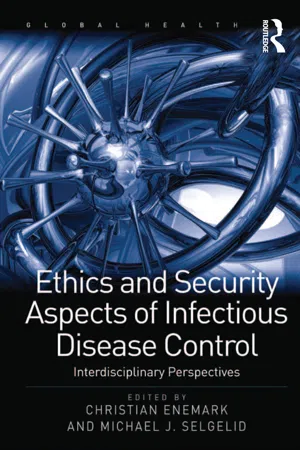
Ethics and Security Aspects of Infectious Disease Control
Interdisciplinary Perspectives
- 264 pages
- English
- ePUB (mobile friendly)
- Available on iOS & Android
Ethics and Security Aspects of Infectious Disease Control
Interdisciplinary Perspectives
About This Book
The increasing emergence, re-emergence, and spread of deadly infectious diseases which pose health, economic, security and ethical challenges for states and people around the world, has given rise to an important global debate. The actual or potential burden of infectious diseases is sometimes so great that governments treat them as threats to national security. However, such treatment potentially increases the risk that emergency disease-control measures will be ineffective, counterproductive and/or unjust. Research on ethical issues associated with infectious disease is a relatively new and rapidly growing area of academic inquiry, as is research on infectious diseases within the field of security studies. This volume incorporates ethical and security perspectives, thus furthering research in both fields. Its unique focus on the intersection of ethical and security dimensions will, furthermore, generate fresh insights on how governments should respond to infectious disease challenges. Readers should include professionals and scholars working in infectious disease, epidemiology, public health, health law, health economics, public policy, bioethics, medical humanities, health and human rights, social/political philosophy, security studies, and international politics.
Frequently asked questions
Information
1 The Concept of Security
Introduction
Security and Essential Contestability
[T]he major source of a concept’s essential contestedness is the normative standard embodied by its criteria. This is to say that a concept is essentially contested if its rival uses express competing moral and political perspectives.
Legitimate Purposes
Table of contents
- Cover
- Halftitle Page
- Routledge Page
- Title Page
- Copyright Page
- Contents
- List of Figures
- List of Tables
- List of Abbreviations
- Notes on Contributors
- Dedication
- Introduction
- 1 The Concept of Security
- 2 The Value of Security: A Moderate Pluralist Perspective
- 3 HIV/AIDS, Security and Ethics
- 4 Filth and Failure: The Security Politics of Cholera
- 5 Securitizing Epidemics: Three Lessons from History
- 6 The Disappearing Act of Global Health Security
- 7 Extending Ethical Justification for Public Health Surveillance to Situation Awareness
- 8 Electronic Surveillance for Communicable Disease Prevention and Control: Health Protection or a Threat to Privacy and Autonomy?
- 9 Ethics of Research in Epidemic Response
- 10 Media Ethics and Infectious Disease
- 11 Ethics and Indigeneity in Responding to Pandemic Influenza: Mori Values in New Zealand’s Emergency Planning
- 12 Governance, Rights and Pandemics: Science, Public Health or Individual Rights?
- Index